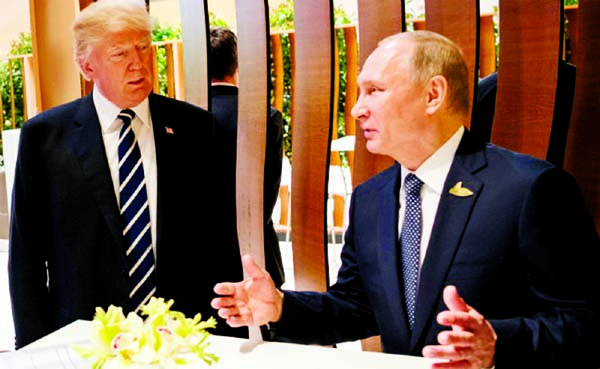
The United States and Russia are pledging to abide by a treaty limiting strategic nuclear weapons that took effect on Monday, but foreign leaders and experts fear a new arms race may be looming.
Concern over a potential conflict with nuclear-armed North Korea is also growing following a series of bellicose statements between Washington and Pyongyang.
The Strategic Arms Reduction Treaty (New START) signed in 2010 requires the United States and Russia to have reduced the number of their deployed nuclear warheads to 1,550 each by February 5, 2018.
The State Department said Monday the United States has lived up to the deal and it has “no reason to believe” Russia has done otherwise.
Russia for its part said it was committed to the treaty and would provide Washington with data on its strategic nuclear arsenal in “the near future.”
The New START treaty calls for inspections and for the world’s two leading nuclear powers to exchange data on their arsenals to verify compliance.
The treaty signed by president Barack Obama was aimed at ushering in a new era in US-Russian relations and promoting the goal of doing away with nuclear arms.
But those twin objectives appear distant and President Donald Trump has little room for maneuver with Moscow as he grapples with allegations his campaign may have colluded with the Kremlin to get him elected.
The New START treaty, the State Department said, is “critically important at a time when trust in the relationship has deteriorated and the threat of miscalculation and misperception has risen.”
Mistrust of Russian intentions was reflected on Friday in a Nuclear Posture Review released by the Pentagon that called for a revamp of the US nuclear arsenal and development of new low-yield atomic weapons.
While the document underscored the administration’s concerns about North Korea, Iran and China, the focus fell largely on Russia.
“This is a response to Russian expansion of their capability and the nature of their strategy and doctrine,” Defense Secretary Jim Mattis wrote.
Moscow denounced what it called the “bellicose” and “anti-Russian” nature of the new US nuclear policy, warning that it would take the necessary measures to ensure its own security.

